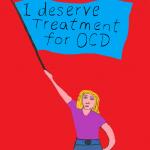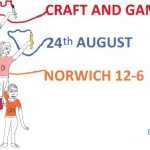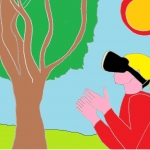Esme’s Story
October 16th 2014
* Possible Trigger Warning *
 I’ve had obsessions and compulsions for as long as I can remember, and looking back at my childhood, my mum now even sees that the quirky ‘traditions’ I used to do as a toddler are likely to have been caused by the OCD that runs in my family.
I’ve had obsessions and compulsions for as long as I can remember, and looking back at my childhood, my mum now even sees that the quirky ‘traditions’ I used to do as a toddler are likely to have been caused by the OCD that runs in my family.
I first became seriously unwell with mental illness when I was 12 years old, where I became clinically depressed and began cutting myself. I also tried to commit suicide. Everybody was so worried about what I was doing that nobody asked the right questions to find out why I was doing it. I had no idea that my intrusive thoughts and obsessions, or my excessive counting rituals, were anything other than normal, so I never mentioned them to my doctors or therapist, and my OCD went undiscovered for another few years.
It wasn’t until I was 15 years old when I finally got my diagnosis, as my OCD had spiralled out of control to the point where my mum was noticing the rituals I was having to do; she realised what was wrong when she was seeing me shutting all the doors in the house a certain number of times until it felt ‘just right’, which could take hours. I was referred for further therapy but was also started on a medication called an SSRI that allowed me to turn my OCD around, and I began to recover.
When I started at university, things began to get worse again. It was so frustrating, as I had worked so hard to finally get where I wanted to be at medical school, and my OCD was taking it all away from me. Over three years, OCD gradually consumed me to the point where I struggled to leave the house in order to go to lectures or socialise with friends. My mood became very low again, my self-harming, which had been well controlled, got worse and I attempted suicide once more. Luckily, my friends noticed how unwell I was and got me the help I needed from my GP, who got me re-referred to see a psychiatrist. I was started on a second medication, an anti-psychotic, which gradually began to help ease my obsessions and allowed me to work on cutting down my compulsions, so I could get my life back. I also began receiving Disabled Students Allowance, which helped me with being able to cope at university, so I could get back to doing what I love on my degree course.
At my worst, it would take me six hours to do all my bedtime rituals, but now it only takes me one and a half hours (on a good day). There is still work left to do on fighting my OCD, and I’m hoping to do this with more cognitive behavioural therapy.
In my role as Chair of the OCD Youth Action Panel, I hope to be able to provide a way for other young people with OCD to get support from each other so that they know that they’re not alone, and that there is hope for recovery from the extremely debilitating condition that is OCD.







